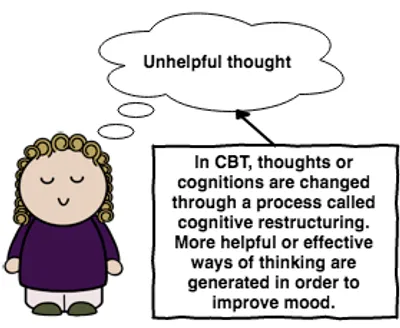Menu

Are you looking for a psychologist Melbourne to help with anxiety, depression, other mental health issues, or to access mental health services? Discover how Cognitive Behaviour Therapy (CBT), provided by Melbourne-based psychologists, offers effective and structured support for improved well being and quality of life.
Cognitive Behaviour Therapy (CBT) focuses on restructuring thoughts and behaviours to enhance mental health, utilising a structured approach with measurable goals.
CBT is effective for various mental health conditions, including anxiety, depression, low self-esteem, and eating disorders, making it a versatile treatment option.
Engaging with Melbourne-based CBT psychologists provides accessibility and personalised psychological support, which improves client engagement, facilitates personal growth, and enhances treatment outcomes.
Cova Psychology offers CBT either face to face with Melbourne CBT psychologists or via telehealth to anywhere in Australia.
Cognitive Behaviour Therapy, often known as CBT, is a therapeutic approach that effectively modifies individuals’ perceptions and reactions to challenging situations. At Cova Psychology in Melbourne, our psychologists are highly experienced in this form of therapy. CBT works with three fundamental aspects:
the cognitive aspect (pertaining to thoughts)
behavioural aspect (relating to actions) and
therapy itself (the process of examining thoughts and behaviours within a supportive therapeutic relationship).
In CBT treatment, you and your and therapist will work together to set up a series of treatment goals aiming to reduce symptoms whilst your well-being. Working towards these goals involves using therapy sessions to explore how your thoughts and behaviour impact your mood. Homework tasks are set for you to complete in between sessions – these tasks are important for the treatment to be effective.
An extensive body of research spanning the past four decades has demonstrated that CBT is an effective psychological intervention. As such, it is widely used throughout Melbourne and Australia, and is recognised as an effective treatment by Medicare.
Cognitive behaviour therapy (CBT) is widely recognised for its successful outcomes in treating a variety of mental health conditions.
Studies have shown that CBT can lead to meaningful improvement in mood and overall function among individuals suffering from depression, anxiety, and similar disorders. Additionally, CBT is effective in treating personality disorders, helping clients navigate even well engrained emotional and behavioural challenges. Schema therapy is another effective therapeutic approach that can be used in conjunction with CBT to manage emotional and behavioural issues.
The comprehensive nature of CBT makes it an excellent option for tackling numerous mental health concerns such as:
Low self-esteem
Body image problems and Eating Disorders
Phobias
A key advantage of CBT lies in its goal-directed framework, which emphasises clearly defined objectives and quantifiable results. Often considered a brief therapy, the duration ranges from several weeks to a few months. This time-efficient aspect contributes to its appeal among those seeking prompt and effective mental health assistance. The flexibility inherent within CBT also allows for customisation according to people’s unique needs across all age groups and cultural contexts.
Cognitive behaviour therapy (CBT) is fundamentally based on the idea that mental health problems are often rooted in negative thoughts about oneself and one’s environment. By working with clients to identify and shift these painful thinking patterns, CBT therapists work to reduce and manage psychological distress.


In pursuing therapeutic goals within a CBT framework, a crucial element involves setting goals to reduce symptoms and improve overall wellness. To make progress between sessions, therapists assign homework tasks for clients. These tasks are essential for reinforcing skills learned during treatment and building independent coping abilities for future stressors.
Behavioural activation is another aspect of CBT. It encourages individuals to engage in enjoyable activities to lift their mood. During therapy, professionals explain what clients can expect from future sessions, ensuring they understand the process and feel comfortable throughout their CBT journey.
Cognitive behaviour therapy (CBT) is a flexible therapeutic approach designed to address specific mental health conditions like anxiety disorders, eating disorders, and depression. CBT is an approach which empowers clients to identify unhelpful thinking patterns, fostering self-reliance in managing emotional challenges with the guidance of a psychologist. It can also be used to treat post traumatic stress disorder (PTSD) and Complex Trauma.
Cognitive Behavioural Therapy (CBT) is recognised as an effective treatment for anxiety disorders. It helps individuals identify and change harmful thinking habits that increase their anxiety. One key technique within CBT for anxiety is exposure therapy. This method gradually introduces clients to their fears, reducing anxious reactions over time and allowing better control over anxiety triggers. CBT is also effective in treating anxiety-related disorders such as obsessive-compulsive disorder.
CBT targets the negative thought patterns that lead to feelings of hopelessness and low self-worth in those experiencing depression. By changing these harmful thoughts, it encourages clients to engage in activities that improve their mood and overall health.
The goal of using CBT for treating depression is to improve emotional well-being by changing negative thinking habits. It helps clients develop a more positive outlook on life and reduces the impact of depressive thoughts on daily activities. This makes CBT a powerful treatment option for depression, helping individuals gain control over their emotions and take back their lives.
In addressing eating disorders, Cognitive Behavioural Therapy (CBT) aims to change harmful eating patterns and distorted perceptions about body image and self-esteem. Enhanced Cognitive Behavioural Therapy (CBT-E) focuses on the cognitive processes and behaviours typical of these disorders, providing a targeted treatment approach.
The therapy includes techniques to change damaging habits related to food consumption and body image. Addressing these areas helps individuals develop healthier routines that improve both their mental and physical health.
As a result, CBT is an essential tool for effectively treating eating disorders by focusing on problematic thoughts and actions related to them. CBT is also used to treat traumatic stress disorder.
Engaging with a psychologist at Cova Psychology in Melbourne who specializes in mental health services and Cognitive Behavioural Therapy (CBT) offers several benefits. We are available in the Melbourne CBD for in-person appointments, as well as via telehealth to anywhere in Australia. CBT therapists at Cova Psychology offer personalized support that takes into account the cultural and community aspects of their clients, enhancing the therapist-client relationship. We are also passionate about assessing the needs of each individual so that we can tailor treatment in a personalized way. Whilst CBT may be a primary therapy provided as part of someone’s treatment plan, our psychologists can complement CBT with other effective therapies based on the needs of the individual. For some people, mindfulness, Dialectical Behaviour Therapy, or Eye Movement Desensitisation Reprocessing (EMDR) might also be important components of their treatment.
In the first session of cognitive-behavioural therapy (CBT), your therapist will carry out an evaluation to ascertain whether CBT is appropriate for you. This process includes a conversation about your history, present challenges, and the impact of these mental health difficulties on your everyday life. The purpose of this assessment is for the therapist to gain insights into your personal circumstances so they can customise the treatment accordingly.
The approach taken in CBT sessions is systematic and focused on achieving clear goals. It targets specific problems with outcomes that can be tracked and measured. Your therapist will explain the treatment process, preparing you for future sessions as part of this journey toward better mental health through its structured nature.
Active engagement and dedication to the process are important for successful cognitive behavioural therapy (CBT). Building a strong connection with your therapist is essential for positive outcomes. Clients must feel comfortable and trust their psychologist to enhance their therapy experience. Commitment therapy is another approach that requires active engagement and dedication.
During CBT sessions, therapists may assign homework exercises that reinforce the techniques practiced in sessions. These tasks could include keeping track of thoughts and actions in a journal, which helps both client and therapist review these reflections in later meetings. Such routines help clients understand their thought processes and behaviours better, which is key for effective treatment.
Therapists promote a collaborative approach, ensuring clients feel comfortable with each step. Numerous studies support CBT’s ability to create lasting changes in thinking patterns that can prevent future mental health issues. This strong commitment to active participation throughout therapy is vital for fostering positive change and improving overall mental wellness.
Starting therapy at Cova Psychology is straightforward. To book your session, call 03 9654 3557 or fill out the enquiry form on our website.
For those unable to visit in person, we provide telehealth services, ensuring you can access essential therapy from anywhere in Australia. This makes it easier for everyone to take steps toward better mental health.
Cognitive behaviour therapy (CBT) is an effective approach for addressing a range of mental health issues. By focusing on the relationship between thoughts, emotions, and behaviours, CBT helps individuals make meaningful changes in their lives. Whether you’re dealing with anxiety, depression, or eating disorders, CBT offers targeted strategies to help you overcome your challenges.
Starting with a Melbourne-based CBT psychologist is easy. If you’re ready to take the first step towards better mental health, consider reaching out to us at Cova Psychology for a CBT therapist in Melbourne. We will guide you through the process of starting with a new therapist, including helping you set up access to Medicare rebates. Your journey to a healthier, happier life starts here.
Cova Psychology offers Cognitive Behaviour Therapy (CBT) to its clients. This approach focuses on modifying negative thought patterns to improve emotional well-being.
Cova Psychology offers Cognitive Behaviour Therapy (CBT) to its clients. This approach focuses on modifying negative thought patterns to improve emotional well-being.
The main components of Cognitive Behaviour Therapy (CBT) are cognitive processes (thoughts), behavioural actions, and the therapeutic relationship that facilitates the exploration of these elements.
This structured approach aims to identify and change unhelpful thought patterns and behaviours.
CBT treatment focuses on setting clear targets that are designed to reduce symptoms and improve overall mental well-being.
Through this systematic method, it is able to tackle issues related to mental health effectively.
CBT treatment incorporates homework assignments that patients are expected to complete between sessions, which are crucial for the overall effectiveness of the therapy. This practice reinforces the concepts learned during sessions and helps in applying them to real-life situations.
Extensive research over the past forty years has consistently shown Cognitive Behavioural Therapy (CBT) to be a highly effective method of treatment, earning recognition from Medicare for its efficacy in psychological interventions aimed at tackling different mental health issues.


Our Melbourne Psychologists and trauma therapists provide in a range of therapies including CBT and EMDR Therapy. Our therapists are keen to meet you, get to know you, and create a treatment plan tailored to you.
Contact our friendly reception team to book an initial appointment on by:
We are available for both face to face and telehealth sessions.
Let’s discuss your needs and match you with the right Melbourne psychologist.



Don't let your struggles hold you back. Call us.
Let’s discuss your needs and match you with the right Melbourne psychologist.
Let’s discuss your needs and match you with the right Melbourne psychologist



Acknowledgement of Country
Cova Psychology acknowledges the Traditional Owners of the land where our Melbourne CBD practice is located—the Wurundjeri Woi-wurrung and Bunurong/Boon Wurrung peoples of the Kulin Nation. We pay respect to their Elders, past and present, as well as the Elders of other Aboriginal communities in Melbourne and beyond.






We would like to acknowledge the Traditional Owners of the land on which the practice is located. We pay our respects to their Elders, past and present, and the Aboriginal Elders of other communities who may be here today.























